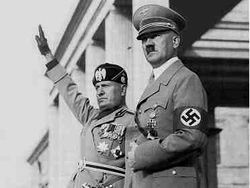Category:Cinema--1930s
|
|
Cinema : 2020s -- 2010s -- 2000s -- 1990s -- 1980s -- 1970s -- 1960s -- 1950s -- 1940s -- 1930s -- 1920s -- 1910s -- 1900s -- 1850s Fiction : 2020s -- 2010s -- 2000s -- 1990s -- 1980s -- 1970s -- 1960s -- 1950s -- 1940s -- 1930s -- 1920s -- 1910s -- 1900s -- 1850s -- 1800s -- 1700s -- 1600s -- 1500s -- 1450s -- Home Timeline : 2020s -- 2010s -- 2000s -- 1990s -- 1980s -- 1970s -- 1960s -- 1950s -- 1940s -- 1930s -- 1920s -- 1910s -- 1900s -- 1850s -- 1800s -- 1700s -- 1600s -- 1500s -- 1450s -- Medieval -- Home
Languages Cinema : English -- French -- German -- Italian -- Spanish -/- Other Fiction : English -- French -- German -- Italian -- Spanish -/- Other
|
History of Research (1930s) -- Notes
Due to the lasting success of Kings of Kings (1927), no major Jesus movie was produced in the United States in the 1930s. The most ambitious project was completed in France, Golgotha(1935), by Julien Duvivier with an exceptional cast of French actors.
Filmmakers and screenwriters focused their attention rather on the background(s) of the New Testament.
Cecil DeMille reached another smashing success in 1932 with the film The Sign of the Cross. The third, and most famous, film version of Barrett's drama presented a combination of spectacle, violence, sex, and the moral victory of religion, which proved to be very popular with moviegoers all around the globe. Following DeMille's footsteps, the 1935 version of The Last Days of Pompeii by Ernest B. Schoedsack departed radically from the original plot, to turn the story into a moral tale about the life and suffering of early Christians until the climatic finale with God's revenge through the eruption of Mount Vesuvio. In a similar fashion, the 1938 British movie The Life of St. Paul / The Crown of Righteousness, directed by Norman Walker, explored Christian Origins, first making Paul of Tarsus the protagonist of the story.
The film The Great Commandment (1939) was the first feature film to focus on the Jewish background of the Gospel. It portrayed the conversion to Christianity of a young Zealot, Joel, and the Roman soldier Longinus. DeMille's Cleopatra (1934) also had some impact in Second Temple Studies as among the major characters it included Herod the Great, played by Joseph Schildkraut.
"Joseph in the Land of Egypt" (1932) was the first talkie filmed in Yiddish. The film was well received in the United States and became a hit in Poland.
Broadcast on 2 April 1939 by the BBC, the Passion play Caesar's Friend was the first fictional work of biblical subject to be aired on television.
Pages in category "Cinema--1930s"
The following 13 pages are in this category, out of 13 total.
1
- Yoysef in Mitsraim / Joseph in the Land of Egypt (1932 Roland), feature film
- Der vanderer Yid (The Wandering Jew / 1933 Roland), feature film
- Barabbas (1935 Sloan), feature film
- Androcles and the Lion (1938 Davis / @1912 Shaw), British (TV) production (play)
- Caesar's Friend (1939 / @1933 Dixon, Morrah), British (TV) production (play)
- Prince of Peace (1939 Carter), short film
Media in category "Cinema--1930s"
The following 8 files are in this category, out of 8 total.
- 1932 * DeMille (film).jpg 288 × 436; 197 KB
- 1933 Elvey (film).jpg 343 × 541; 119 KB
- 1934 DeMille (film).jpg 234 × 350; 53 KB
- 1935 Duvivier (film).jpg 183 × 250; 11 KB
- 1935 * Schoedsack (film).jpg 330 × 469; 68 KB
- 1936 Connelly (film).jpg 200 × 284; 17 KB
- 1938 Walker (film).jpg 340 × 481; 213 KB
- 1939 Pichel (film).jpg 214 × 317; 17 KB











